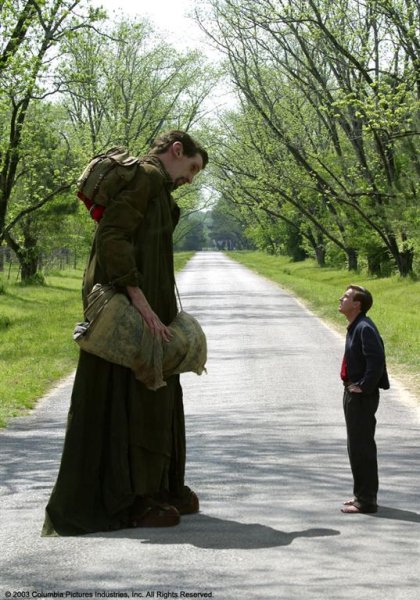domingo, 8 de junio de 2008
Answers
Personality: Pete is a timid, bitter person who hides his emotions in his nonexpressive personality; Barton, although timid also, he expresses emotion directly into his work in wich he makes the theater for the "common man". Bothe characters have a change of personality to the end, but Pete´s is more dramatic.
Body:The body is at first sight very variable, but when one observes enough, one realizes that the major differences are the hairdo and the physical formation.
Body Language: The clearest representation is Barton´s discussion with Charlie about the common man, full with (even violent) expressions. While Pete just expresses himself in times of reconciliation or plead (the execution part).
Elocution: It isn´t so radical due to the fact that Baron speaks for the "common man" and Pete is just a plain ol´ country man.
Question 2:
The differnet author perspective portrayed in the film are those that were lived in the romanticism. Barton is the author of the film, but not the creator of the idea. Ideas are just transmitted by others. In the example of Audrey and her lover. And even in a film producing companny the author is faded, by a director, producer, and all the other transmittters.
In conlusion, our society lives by carryieng on ideas, no mattering who created them.
Question 3:
It is evident that idealism in literature doesný exist. But yet, authors blind themselves, inspirate themselves, and work for an ideal reader. In Barton Fink´s case: "the common man".
Through it he obtains an inspiration with out redefining a "common man", he just says " a man like you and me".
An ideal author is that evoked by Barton´s producer, 20 idela authors to give the Barton Fink feeling, 20 authors he idealized like he did with Barton at the first part of the movie.
But according to the piece of work done, it differs, an ideal author for a film is a dramatic and exagerated one, and for novel, a descriptive one, who mixes drama without exagerating to much, or doing so to make a fantasy: a thriller perhaps.
For Monday 9
-Personality
-Body
-Body Language
-Elocution
2.-Analyze de different author perspectives.
3.-Develop the concepts of Ideal Author and Ideal Reader.
martes, 27 de mayo de 2008
About the Coens...
Joel Coen (born November 29, 1954) and Ethan Coen (born September 21, 1957) grew up in St. Louis Park, Minnesota, a suburb of Minneapolis. Their parents, Edward and Rena Coen, both Jewish, were professors, their father an economist at the University of Minnesota and their mother an art historian at St. Cloud State University.
When they were children, Joel saved money from mowing lawns to buy a Vivitar Super 8 camera. Together, the brothers remade movies they saw on television with a neighborhood kid, Mark Zimering ("Zeimers"), as the star. Their first attempt was a romp titled, Henry Kissinger, Man on the Go. Cornel Wilde's The Naked Prey (1966) became their Zeimers in Zambia,[4]which also featured Ethan as a native with a spear.
The brothers graduated from St. Louis Park (MN) High School in 1973 and 1976. They both also graduated from Simon's Rock College of Bard (now Bard College at Simon's Rock) in Great Barrington, Massachusetts. Joel then spent four years in the undergraduate film program at New York University where he made a 30-minute thesis film called Soundings. The film depicted a woman engaged in sex with her deaf boyfriend while verbally fantasizing about having sex with her boyfriend's best friend, who is listening in the next room.[citation needed] Ethan went on to Princeton University and earned an undergraduate degree in philosophy in 1979. His senior thesis was a 41-page essay, "Two Views of Wittgenstein's Later Philosophy."
In the late 70s both brothers lived in the Weinstein dormitory at 5-11 University Place, an NYU dorm noted for housing such creatives as Ralph Bakshi, Rick Rubin (Def Jam), and film makers Chris Columbus and Dan Goldman (Mr. Danny).
I will keep updating this with new articles and essays
Barton Fink Images
Tareas: Preguntas de Barton Fink
2.-Which Proust´s work is evoked in the film?
3.-Why it´s so damn hot in the hotel?
4.-Who are the usual players in the Coen´s films?
5.-What is a "B" movie?
6.-Discuss the idea(s) of author conveyed in the film
Due for Monday, 2nd June
Exámenes ¿Quién se va a semestral o a anual?
201
3 Sofía
16 Juan Carlos
24 César
202
5 Renata
8 Jimena
18 Gala
23 Eira
203
12 Nicolas
20 Kevin
34 Cristina





